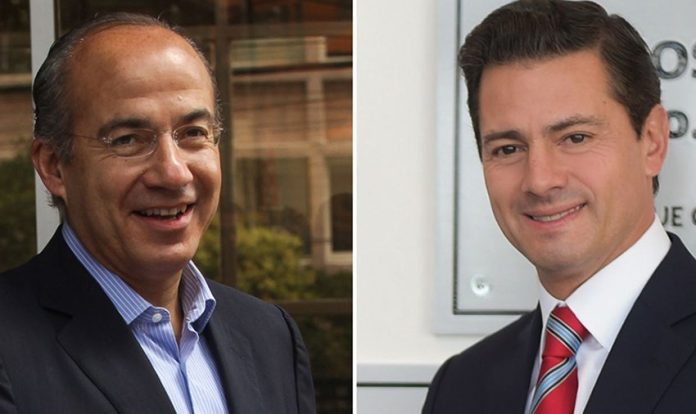A lawyer for former drug lord Joaquín “El Chapo” Guzmán claimed yesterday that the Sinaloa Cartel paid huge bribes to the current Mexican president and his predecessor.
In his opening statement at the New York trial of the former capo, Jeffrey Lichtman said that the “real” Sinaloa Cartel leader, Ismael “El Mayo” Zambada, paid millions of dollars in bribes to President Peña Nieto and ex-president Felipe Calderón to avoid capture.
Zambada has been left free because he “bribes the entire government of Mexico including up to the very top, the current president of Mexico and the former,” Lichtman said.
Presidential spokesman Eduardo Sánchez and Calderón, who left office in 2012, quickly rejected the claim.
“The government of Enrique Peña Nieto pursued, captured and extradited the criminal Joaquín Guzmán Loera. The assertions attributed to his lawyer are completely false and defamatory,” Sánchez wrote on Twitter.
Lichtman’s assertions “are absolutely false and reckless,” Calderón tweeted. “Not him [Zambada] nor the Sinaloa Cartel or any other person made payments to me.”
On the first day of Guzmán’s trial for drug smuggling, conspiracy, firearms offenses and money laundering in a Brooklyn federal court, Lichtman told the judge and jury that Zambada is the real mastermind of the cartel and that Guzmán is no more than a “scapegoat” — a “nobody” with a second-grade education.
“He’s blamed for being the leader while the real leaders are living freely and openly in Mexico. In truth, he controlled nothing. Mayo Zambada did,” he said.
“The world is focusing on this mythical El Chapo creature,” Lichtman continued. “The world is not focusing on Mayo Zambada . . . Mayo can get people arrested and get the Mexican army and police to kill who he wants.”
The lawyer said that since El Chapo’s extradition to the United States in January last year, “the flow of drugs [to the U.S.] hasn’t stopped.”
Prior to Lichtman’s opening remarks, federal attorney Adam Fels presented the United States government’s case, asserting that prosecutors would prove that Guzmán rose from a small-time marijuana trafficker in the 1970s to chief of the Sinaloa Cartel.
Guzmán, 61, established relationships with Colombian cartels that allowed him to move massive amounts of cocaine into the United States, bringing him billions of dollars in profits, Fels told jurors.
Cocaine shipments seized by authorities add up to “more than a line of cocaine for every single person in the United States,” he said.
Fels also told jurors that Guzmán was responsible for turning parts of Mexico into war zones as he fought against rival cartels to expand the Sinaloa Cartel’s influence and power.
The jury will hear about how Guzmán personally shot two members of a rival cartel and ordered that their bodies be thrown into holes and burned, he added.
“He was a hands-on leader,” Fels said, referring to Guzmán’s involvement in day-to-day cartel activities.
All told, Guzmán faces 17 criminal charges and, if convicted, a possible life sentence. He appeared in court yesterday dressed in a dark suit and remained calm as he listened to proceedings with the aid of a translator.
The notorious drug lord, who has been held in solitary confinement in a Manhattan prison for almost two years, appeared almost happy and blew a kiss to his 29-year-old wife, Emma Coronel, who was sitting in the public gallery.
Prosecutors’ witnesses are expected to include former Sinaloa Cartel members and Guzmán associates including Zambada’s brother, Jesús “El Rey” Zambada, and son Vicente Zambada.
The latter, known by the nickname El Vicentillo, last week pleaded guilty to drug trafficking charges in a United States federal court.
Vicente Zambada, a former logistics chief for the Sinaloa Cartel, said in a plea agreement that he will cooperate with prosecutors in the hope that in exchange he will receive a reduced sentence and protection for his family from cartel retribution.
Lichtman, an experienced criminal lawyer who previously defended New York mobster John A. Gotti, attacked the credibility of the potential witnesses.
“Why is the government going so far in this case using these gutter human beings as the evidence?” he asked.
“It’s because the conviction of Chapo Guzman is the biggest prize this prosecution could ever dream of.”
Lichtman also urged the jury “to keep an open mind” and consider that law enforcement authorities in both Mexico and the United States could be corrupt.
“They work together when it suits them, Mayo [Zambada] and the United States government,” he said.
Almost immediately after Lichtman’s opening remarks, Judge Brian M. Cogan excused the jury and cautioned the lawyer against making statements that might not be supported by evidence.
The trial is being held under extraordinarily tight security. Jurors are escorted to and from the court by armed federal marshals.
Guzmán, who twice escaped from prison in Mexico, has been accompanied by heavily armed federal officials and New York police on his journeys from his cell to the federal court.
The trial, which is expected to last between two and four months, continues today.
Source: AFP (sp), Reuters (sp), El Financiero (sp)
